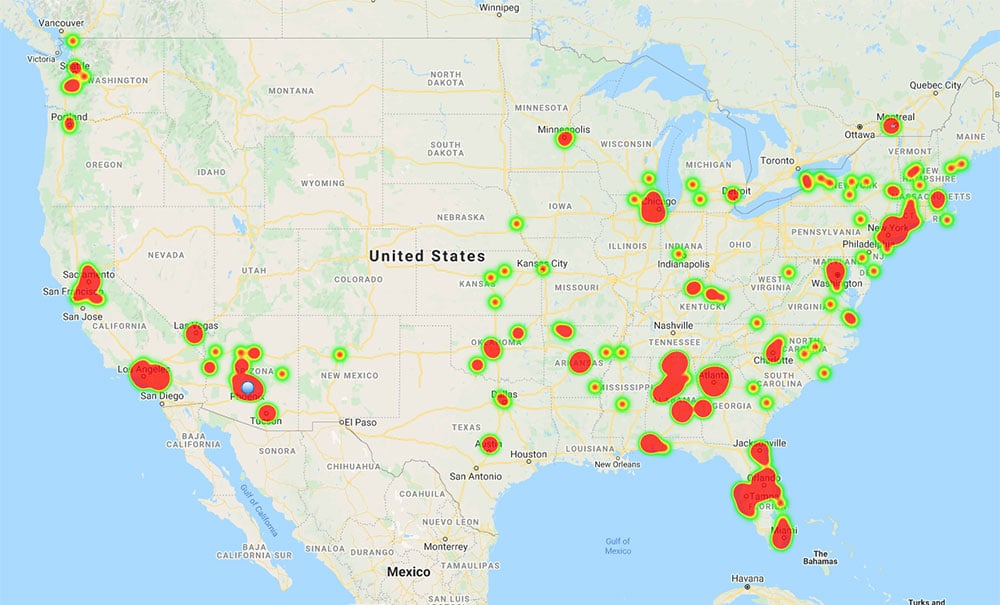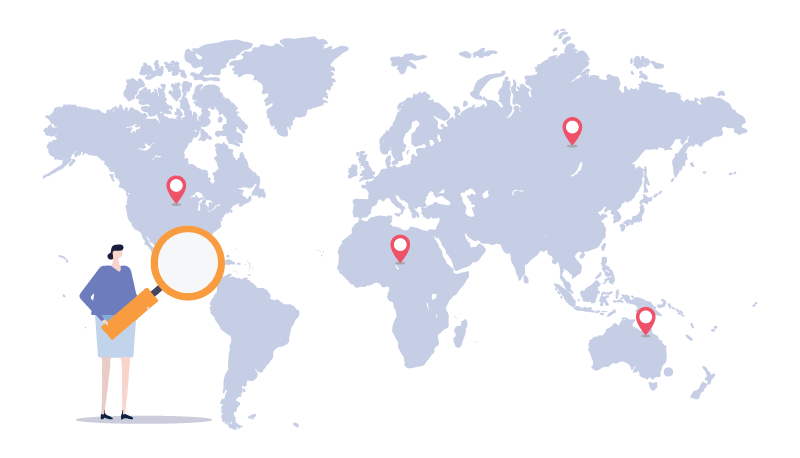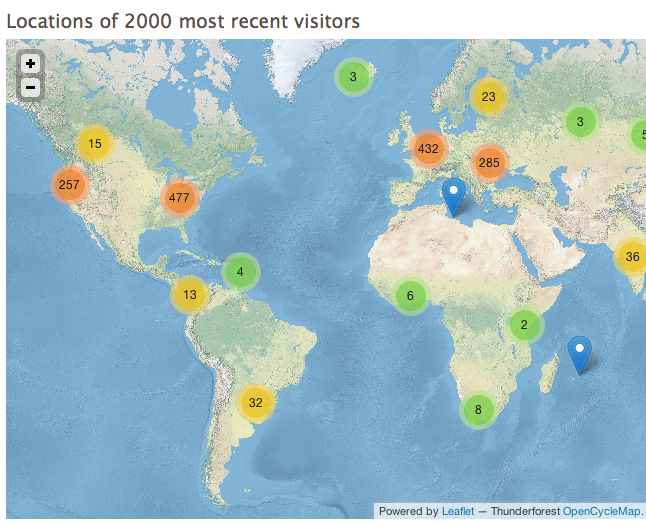Unveiling the World Through IP Addresses: A Guide to Geolocation Mapping
Related Articles: Unveiling the World Through IP Addresses: A Guide to Geolocation Mapping
Introduction
With enthusiasm, let’s navigate through the intriguing topic related to Unveiling the World Through IP Addresses: A Guide to Geolocation Mapping. Let’s weave interesting information and offer fresh perspectives to the readers.
Table of Content
Unveiling the World Through IP Addresses: A Guide to Geolocation Mapping

In the digital age, where information travels at the speed of light, understanding the physical location associated with an IP address has become increasingly crucial. This process, known as IP geolocation, allows users to map IP addresses to their corresponding geographical locations, revealing a wealth of insights about the digital world.
The Fundamentals of IP Geolocation
At its core, IP geolocation relies on the fundamental concept of IP addresses. Every device connected to the internet, from personal computers to smartphones and even smart appliances, is assigned a unique IP address. This address serves as a digital identifier, enabling communication and data exchange across the vast network.
IP geolocation takes this identification a step further by associating the IP address with a physical location. This process involves leveraging various data sources and techniques, including:
- IP Databases: Extensive databases maintain a vast collection of IP address ranges and their corresponding geographical locations. These databases are constantly updated to reflect changes in network infrastructure and user locations.
- Geolocation APIs: Application Programming Interfaces (APIs) provide programmatic access to geolocation data. Developers can integrate these APIs into their applications, allowing for real-time lookup of IP addresses and their associated locations.
- Network Information: Network providers and internet service providers (ISPs) maintain records of their network infrastructure, including the geographical locations of their servers and user connections.
- User-Provided Information: Some geolocation services allow users to voluntarily provide their location information, enriching the database and improving accuracy.
Applications of IP Geolocation: A Multifaceted Tool
The ability to pinpoint the geographical location of an IP address unlocks a wide range of applications across diverse fields:
- Security and Fraud Prevention: Geolocation plays a crucial role in detecting and mitigating security threats. By analyzing the geographical origin of network traffic, security professionals can identify potential malicious activities, such as distributed denial-of-service (DDoS) attacks or attempts to access sensitive information from unauthorized locations. Additionally, geolocation helps in combating online fraud by verifying the location of transactions and identifying suspicious patterns.
- Marketing and Advertising: Geolocation empowers businesses to tailor their marketing campaigns to specific geographical regions. By targeting users based on their location, companies can deliver more relevant and effective advertising messages, maximizing their reach and impact.
- Customer Service and Support: Knowing a user’s location enables companies to provide more personalized customer service. For instance, geolocation can help determine the appropriate language for communication, identify the nearest support center, and provide localized assistance.
- Content Delivery Networks (CDNs): CDNs utilize geolocation to optimize content delivery by routing traffic to the nearest server, minimizing latency and improving user experience. This approach ensures faster loading times and improved performance, especially for users accessing content from geographically distant locations.
- Network Monitoring and Management: Network administrators leverage geolocation to monitor network performance, identify bottlenecks, and optimize network traffic routing. By understanding the geographical distribution of network activity, they can gain insights into usage patterns and proactively address potential issues.
- Research and Analytics: Geolocation data is invaluable for researchers studying various aspects of the internet, including user behavior, online trends, and the spread of information. By analyzing the geographical distribution of online activity, researchers can gain deeper insights into social, economic, and cultural phenomena.
Understanding the Limitations of IP Geolocation
While IP geolocation offers valuable insights, it’s essential to acknowledge its limitations:
- Accuracy: The accuracy of geolocation data can vary depending on the source and method used. Factors like dynamic IP addresses, VPNs, and proxies can introduce inaccuracies, making it challenging to pinpoint the precise location of a user.
- Privacy Concerns: Geolocation raises privacy concerns, as it enables the tracking of user movements and activities. It’s crucial to implement appropriate safeguards and obtain consent before collecting and using geolocation data.
- Data Bias: Geolocation data can reflect existing biases and disparities in internet access and infrastructure. Certain regions may have limited representation in databases, leading to inaccurate or incomplete data.
FAQs about IP Geolocation
Q: How accurate is IP geolocation?
A: The accuracy of IP geolocation varies depending on the data source and method used. While some services provide accurate results down to the city or even street level, others may only be able to pinpoint the general region or country. Factors like dynamic IP addresses, VPNs, and proxies can further impact accuracy.
Q: Is IP geolocation legal?
A: The legality of IP geolocation depends on the specific context and jurisdiction. In general, it’s legal to use geolocation for legitimate purposes, such as security, marketing, and content delivery. However, it’s essential to comply with privacy regulations and obtain consent before collecting and using geolocation data.
Q: Can IP geolocation be used to track users?
A: Yes, IP geolocation can be used to track user movements and activities. However, it’s crucial to use this information responsibly and ethically, respecting user privacy and ensuring transparency.
Q: What are some tips for using IP geolocation effectively?
A: To maximize the effectiveness of IP geolocation, consider the following tips:
- Choose a reliable service provider: Select a reputable geolocation service that offers accurate and up-to-date data.
- Validate results: Always verify geolocation data with other sources to ensure accuracy.
- Respect privacy: Obtain consent before collecting and using geolocation data, and implement appropriate safeguards to protect user privacy.
- Be aware of limitations: Understand the inherent limitations of IP geolocation and avoid relying solely on this data for critical decisions.
Conclusion: A Powerful Tool for Navigating the Digital Landscape
IP geolocation has emerged as an indispensable tool for navigating the complexities of the digital world. Its ability to map IP addresses to geographical locations provides valuable insights for security, marketing, customer service, and various other applications. By understanding the fundamentals of IP geolocation, its applications, and limitations, users can leverage this powerful tool to enhance their online experiences and navigate the digital landscape with greater confidence.








Closure
Thus, we hope this article has provided valuable insights into Unveiling the World Through IP Addresses: A Guide to Geolocation Mapping. We thank you for taking the time to read this article. See you in our next article!